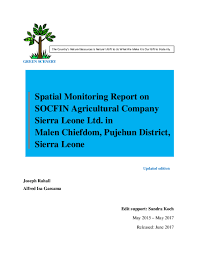Effects of Large-Scale Acquisition on Food Insecurity in Sierra Leone
The recent phenomenon of large-scale acquisition of land for a variety of investment purposes has raised deep concerns over the food security, livelihood and socio-economic development of communities in many regions of the developing world. This study set out to investigate the food security outcomes of land acquisitions in northern Sierra Leone.




